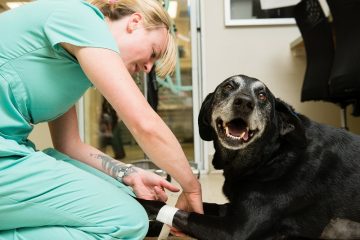UBC Veterinary Antineoplastics Study Survey
To take the UBC survey please go here.

It is estimated that as many as 1 in 4 dogs, and 1 in 6 cats will develop cancer at some time in their life, with half of dogs over 10 years of age dying from cancer (Kidd, 2008).
Antineoplastic drugs used in veterinary practice are largely “off-label” use of drugs designated for human treatment. Many of these drugs have known or suspected adverse health effects in humans.
While larger specialty clinics might be expected to employ standard hazard reduction strategies (such as use of biosafety cabinets for drug compounding, or closed system drug transfer device – CSTD – systems), small veterinary practices are generally less likely to utilize such systems. Similarly, levels of safety knowledge, training, administrative controls and use of PPE are expected to vary across practice size and type.
The BC Veterinarians Study aims to characterize the extent of potential exposure to antineoplastic drugs in BC veterinary settings, as well as practitioner recognition of this hazard, and application of safety control measures.
Contact us if you would like to learn more about this study.